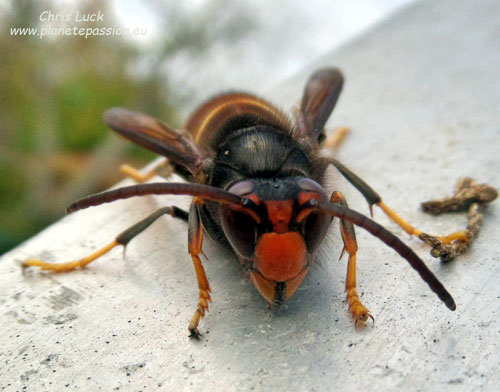Stings from Wasps, Hornets & Bees
No one enjoys being stung
Being stung by a Wasp, Hornet, Bee or any other stinging insect isn’t exactly fun. It can be very painful and may result in extreme irritation and swelling that can last several days and although it is extremely rare for anyone to die, even when stung multiple times there are some people that are at risk of more severe reactions.
In France perhaps as many as 20 people a year may die following being stung,
although usually it’s far fewer than that, which really is an extremely small number when compared to accidental deaths from other everyday causes.
A normal reaction to stings will vary in intensity according to the type of sting, (Bee, Wasp or Hornet), and the individual concerned. This will result in pain, swelling and redness confined to the sting site. A large local reaction will result in swelling that extends beyond the sting site such as a sting on the arm that could result in the entire arm swelling. Although a bit scary in appearance this can usually be treated the same as a normal reaction. An unusually painful or very large local reaction may need medical attention.
Occasionally a severe allergic reaction
can occur causing symptoms such as breathing difficulties, dizziness and a swollen face or mouth. This requires immediate medical treatment and in France you should dial 15. Below is a checklist for severe allergic reaction or anaphylaxis
Any of these symptoms seek medical assistance
Wheezing or difficulty breathing
A swollen face, mouth or throat
Feeling sick or being sick
A fast heart rate
Dizziness or feeling faint
Difficulty swallowing
Loss of consciousness
Although it’s not unusual for people receive 30, 40 or more stings should they disrupt a nest and even though multiple stings aren’t necessarily life threatening they may make you feel ill and require some precautionary treatment. Special attention should be given to stings on the mouth or throat in all cases.
Remember - fear and panic are you enemy and flapping around only disturbs them making them feel threatened.
Once again it should be made clear that severe anaphylactic reactions are a relatively rare occurrence and there should be no need for us to be afraid of any of these insects when they are away from their nests. Even close to their nests they will rarely take an aggressive interest in humans provided the person stays calm and isn’t threatening or disruptive. If possible avoid using products with strong perfumes, such as soaps, shampoos and deodorants. Bees, wasps and hornets have a highly developed sense of smell and these scents can be disagreeable for them.

